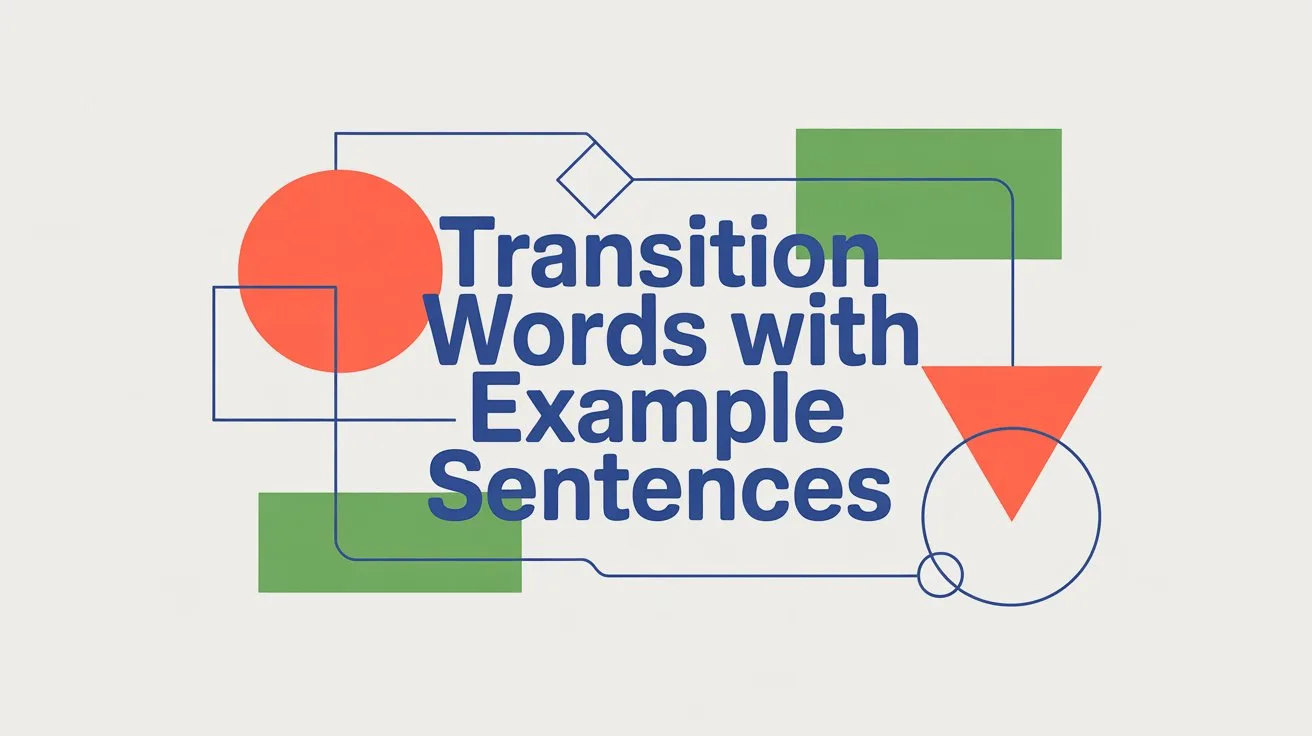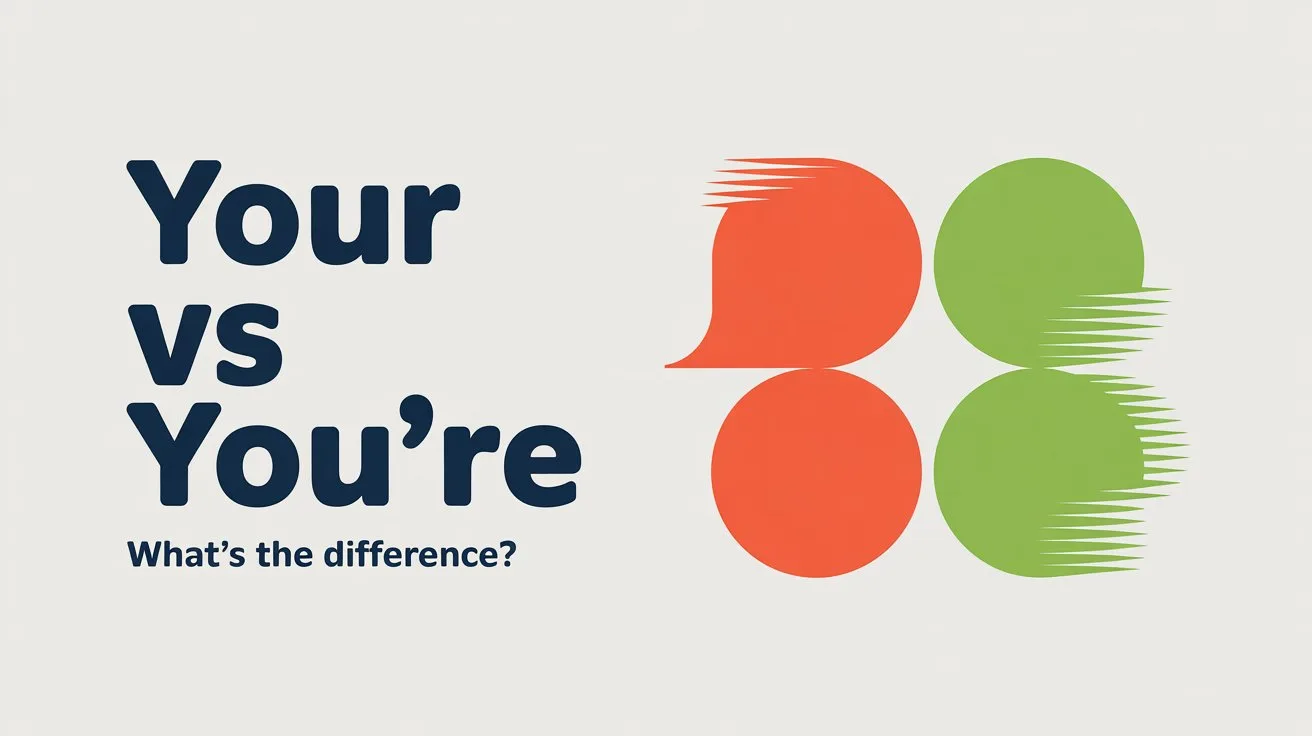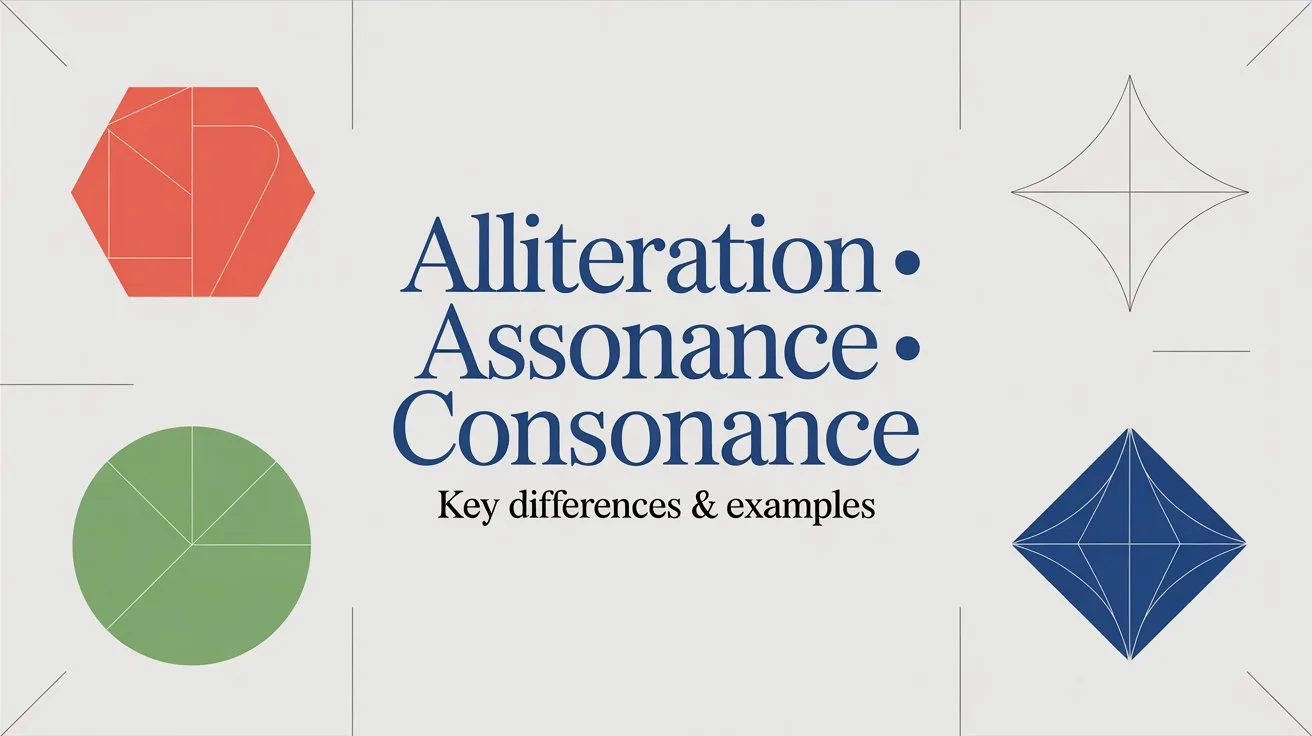It’s not always enough to know which transition words exist. The real challenge is using them correctly in your writing. A word like however or therefore only makes sense when it connects ideas in a clear way. That’s why this guide focuses on transition words in complete sentences. Each example shows how the word fits naturally into context, so you can understand both its meaning and its proper placement in essays and paragraphs.
Examples of Transition Words in Sentences
- However: The plan sounded perfect; however, it failed in practice.
- Therefore: She worked hard; therefore, she passed the exam.
- Moreover: The park is beautiful; moreover, it is well maintained.
- For example: Many fruits are rich in vitamin C; for example, oranges and kiwis.
- In conclusion: In conclusion, teamwork leads to better results.
Addition Transition Words (with Examples)
Addition transition words connect new information to what has already been said. They signal continuation, making writing flow smoothly.
Moreover
Usage: Adds information that reinforces or strengthens the earlier idea, often used in formal writing.
- The city is famous for its historic sites. Moreover, it has vibrant modern attractions that appeal to younger visitors.
- The solution is cost-effective. Moreover, it reduces long-term environmental damage.
In addition
Usage: Introduces extra information, usually in a formal or academic context.
- Students receive printed study guides. In addition, they can access digital resources through the school portal.
- The company improved its customer service. In addition, it launched a loyalty rewards program.
Also
Usage: A simple and flexible word used in everyday English to add more information.
- The library has an extensive book collection. It also provides free access to online journals.
- She enjoys painting. She also spends time teaching art to children.
Furthermore
Usage: Strengthens the link between two statements by adding supportive information.
- The data is reliable. Furthermore, it aligns with previous research findings.
- The proposal saves money. Furthermore, it increases efficiency across departments.
Besides
Usage: Adds another idea, often in informal writing, sometimes suggesting “as well” or “in addition to that.”
- He is skilled in graphic design. Besides, he has experience in video editing.
- The hike was challenging. Besides, the weather made it even more difficult.
Contrast Transition Words (with Examples)
Contrast transition words show differences between two ideas. They are useful when comparing, opposing, or presenting alternatives.
However
Usage: Shows a contrast or an exception to what was just mentioned.
- The plan looked effective. However, it failed during the trial phase.
- She prepared well for the debate. However, her arguments lacked supporting evidence.
Yet
Usage: Introduces an opposing idea that happens despite what came before.
- The movie received poor reviews. Yet, it became a box-office success.
- He is young. Yet, he speaks with great maturity.
On the other hand
Usage: Presents an alternative perspective or opposite side of an argument.
- City life offers many conveniences. On the other hand, rural life provides peace and quiet.
- The product is expensive. On the other hand, its quality justifies the price.
Nevertheless
Usage: Acknowledges a point but shows it does not cancel out the main idea.
- The exam was difficult. Nevertheless, most students passed with good marks.
- He faced criticism. Nevertheless, he continued working on his project.
Although
Usage: Introduces a concession or contrast within the same sentence.
- Although it rained, the event continued as planned.
- Although she was nervous, she delivered an excellent presentation.
Cause and Effect Transition Words (with Examples)
Cause and effect transition words are useful for explaining reasons, results, or logical consequences. They show the relationship between an action and its outcome.
Therefore
Usage: Shows a logical result based on the previous statement.
- The road was blocked. Therefore, we had to find another route.
- She studied consistently for months. Therefore, her improvement was noticeable.
Thus
Usage: Formal word used to indicate a conclusion or result.
- The evidence was incomplete. Thus, the jury could not reach a final decision.
- He miscalculated the expenses. Thus, the project went over budget.
Consequently
Usage: Emphasizes that one event directly follows another as an effect.
- The company reduced staff. Consequently, the workload for remaining employees increased.
- She ignored the instructions. Consequently, the machine stopped working.
As a result
Usage: Common phrase that makes the link between cause and effect clear.
- It rained heavily all night. As a result, the match was postponed.
- He skipped breakfast. As a result, he felt tired during the meeting.
Hence
Usage: A formal connector meaning “for this reason” or “because of that.”
- Demand for the product grew rapidly. Hence, the factory increased production.
- He lacked experience. Hence, his hesitation in taking the lead role.
For a quick overview, check out our List of 100+ Transition Words in English (Quick Reference Guide).
Sequence and Time Transition Words (with Examples)
Sequence and time transition words show the order of events or steps. They are useful in essays, instructions, stories, and reports where clarity of order matters.
First
Usage: Introduces the beginning of a sequence or the first idea in a list.
- First, gather all the required ingredients before you start cooking.
- First, we visited the museum, and then we went to the theater.
Next
Usage: Moves the discussion or action forward to the following step.
- We checked into the hotel. Next, we explored the nearby market.
- She completed the outline. Next, she started writing the essay draft.
Then
Usage: Shows what happens immediately after something else.
- He switched on the computer. Then, he logged into his email account.
- She finished her homework. Then, she joined her friends outside.
Afterwards
Usage: Refers to something that happens later in time.
- They had lunch at the café. Afterwards, they went for a walk in the park.
- He apologized to his friend. Afterwards, they resolved the misunderstanding.
Finally
Usage: Signals the last step or the conclusion of a sequence.
- Finally, after hours of discussion, the committee reached a decision.
- Finally, the concert ended with a spectacular fireworks display.
Example and Illustration Transition Words (with Examples)
Example and illustration transition words make abstract ideas easier to understand by providing concrete details.
For example
Usage: Introduces one or more cases that support a general idea.
- Many fruits are rich in vitamin C. For example, oranges and kiwis contain high amounts.
- Cities have different public transport systems. For example, London has the Underground, and New York has the subway.
For instance
Usage: Similar to for example, but often used in slightly more formal contexts.
- She enjoys outdoor activities. For instance, she often goes hiking on weekends.
- Several countries promote renewable energy. For instance, Germany invests heavily in wind power.
Specifically
Usage: Narrows down a general idea to a particular case.
- The teacher emphasized reading skills. Specifically, she focused on improving comprehension strategies.
- The company addressed safety concerns. Specifically, it improved emergency exit procedures.
Such as
Usage: Introduces examples within a broader category, usually inside a sentence.
- Many animals, such as lions and tigers, live in the reserve.
- Some programming languages, such as Python and JavaScript, are widely used in web development.
In particular
Usage: Highlights a specific example that deserves special attention.
- She loves all kinds of books. In particular, she enjoys historical fiction.
- The conference covered many topics. In particular, the keynote on climate change was memorable.
Conclusion and Summary Transition Words (with Examples)
Conclusion and summary transition words signal that an idea is being wrapped up or restated. They help readers recognize when a discussion is ending or when the main point is being emphasized again.
In conclusion
Usage: Commonly used in essays and formal writing to introduce the final statement.
- The research shows clear benefits of daily exercise. In conclusion, staying active improves both physical and mental health.
- Several solutions were discussed. In conclusion, renewable energy remains the most sustainable option.
To sum up
Usage: Informal or semi-formal way of summarizing key ideas briefly.
- The team worked hard, faced challenges, and achieved their goal. To sum up, the project was a success.
- She trained daily and followed a healthy diet. To sum up, her efforts paid off in the competition.
Overall
Usage: Gives a broad summary that considers all points together.
- There were some minor issues. Overall, the event was well-organized and successful.
- The reviews varied. Overall, the new book received positive feedback.
Finally
Usage: Marks the final point in a series and can also signal closure.
- Finally, we must recognize the importance of teamwork in achieving goals.
- Finally, after months of preparation, the festival opened to the public.
Ultimately
Usage: Suggests a conclusion that comes after considering everything.
- Many strategies were tested. Ultimately, the simplest one proved most effective.
- He considered several career options. Ultimately, he chose to become a teacher.
Emphasis Transition Words (with Examples)
Emphasis transition words draw the reader’s attention to points you want to stress.
Indeed
Usage: Reinforces or strongly affirms the previous statement.
- The discovery was remarkable. Indeed, it changed the direction of the entire research.
- She is an excellent leader. Indeed, her team consistently delivers outstanding results.
Above all
Usage: Highlights the most important point among several.
- He is skilled, hardworking, and creative. Above all, he is reliable.
- Many factors influence success. Above all, persistence makes the difference.
In fact
Usage: Emphasizes that something is true, sometimes surprising or contrary to expectation.
- The class seemed quiet. In fact, they were preparing a surprise presentation.
- Many assumed the task was difficult. In fact, it was easier than expected.
Especially
Usage: Stresses one part of a larger idea.
- The park is beautiful, especially during spring when the flowers bloom.
- She enjoys sports, especially tennis and swimming.
Particularly
Usage: Points to one detail or case as important within a general statement.
- The lecture was helpful, particularly the section on practical examples.
- The restaurant serves many dishes, particularly known for its seafood specialties.
Comparison Transition Words (with Examples)
Comparison transition words help readers see how one point relates closely to another.
Similarly
Usage: Points out a likeness between two situations or ideas.
- The first experiment produced accurate results. Similarly, the second trial confirmed the same findings.
- She values honesty in her friends. Similarly, she expects the same from her colleagues.
Likewise
Usage: Suggests that something applies equally to another case.
- The company improved its customer service. Likewise, its competitors focused on better client support.
- He offered help to his neighbors. Likewise, they supported him during his difficult time.
In the same way
Usage: Highlights an action or idea that mirrors another.
- The teacher explained the first problem clearly. In the same way, she guided the students through the second problem.
- Plants need sunlight to grow. In the same way, humans need knowledge to thrive.
Just as
Usage: Connects two ideas to show they are comparable.
- Just as exercise strengthens the body, reading strengthens the mind.
- Just as farmers prepare the soil, writers prepare ideas before drafting.
Equally
Usage: Stresses that two ideas or factors have the same importance.
- Knowledge and creativity are equally important for problem-solving.
- Both parents are equally responsible for guiding their children.
Condition Transition Words (with Examples)
Condition transition words are useful when describing rules, requirements, or possibilities.
If
Usage: Introduces a condition that must be met for something to happen.
- If you study regularly, you will improve your writing skills.
- If it rains tomorrow, the match will be postponed.
Unless
Usage: Expresses that something will not happen except under a certain condition.
- You cannot join the trip unless you submit the permission form.
- He won’t pass the course unless he completes all assignments.
Provided that
Usage: Sets a requirement that must be fulfilled.
- You can borrow the book, provided that you return it within two weeks.
- The workers will agree to overtime, provided that they receive fair pay.
As long as
Usage: Suggests that something is valid only while the condition continues.
- You can stay here as long as you keep the room clean.
- He will support the plan as long as it benefits the community.
Even if
Usage: Shows that the outcome happens despite the condition.
- She will attend the event even if she has to travel alone.
- Even if it’s difficult, he is determined to finish the project.
Concession Transition Words (with Examples)
Concession transition words acknowledge an opposing point or limitation while keeping the main idea intact. They are common in essays, debates, and persuasive writing.
Although
Usage: Introduces a contrast where both ideas are true, but one outweighs the other.
- Although the task was challenging, the team completed it on time.
- Although he was tired, he continued studying for the exam.
Even though
Usage: Stronger than although; emphasizes that something happens despite difficulty.
- Even though it was raining, the children played outside.
- Even though she lacked experience, she performed exceptionally well.
Though
Usage: Similar to although but often used in less formal writing.
- The book was long, though it was very engaging.
- He joined the competition, though he knew the chances of winning were low.
Whereas
Usage: Highlights a direct contrast between two ideas or situations.
- She enjoys classical music, whereas her brother prefers rock.
- Online courses are flexible, whereas traditional classes follow fixed schedules.
Despite
Usage: Introduces contrast, showing something happened in opposition to conditions.
- Despite the traffic, they arrived on time.
- Despite his injury, he finished the marathon.



